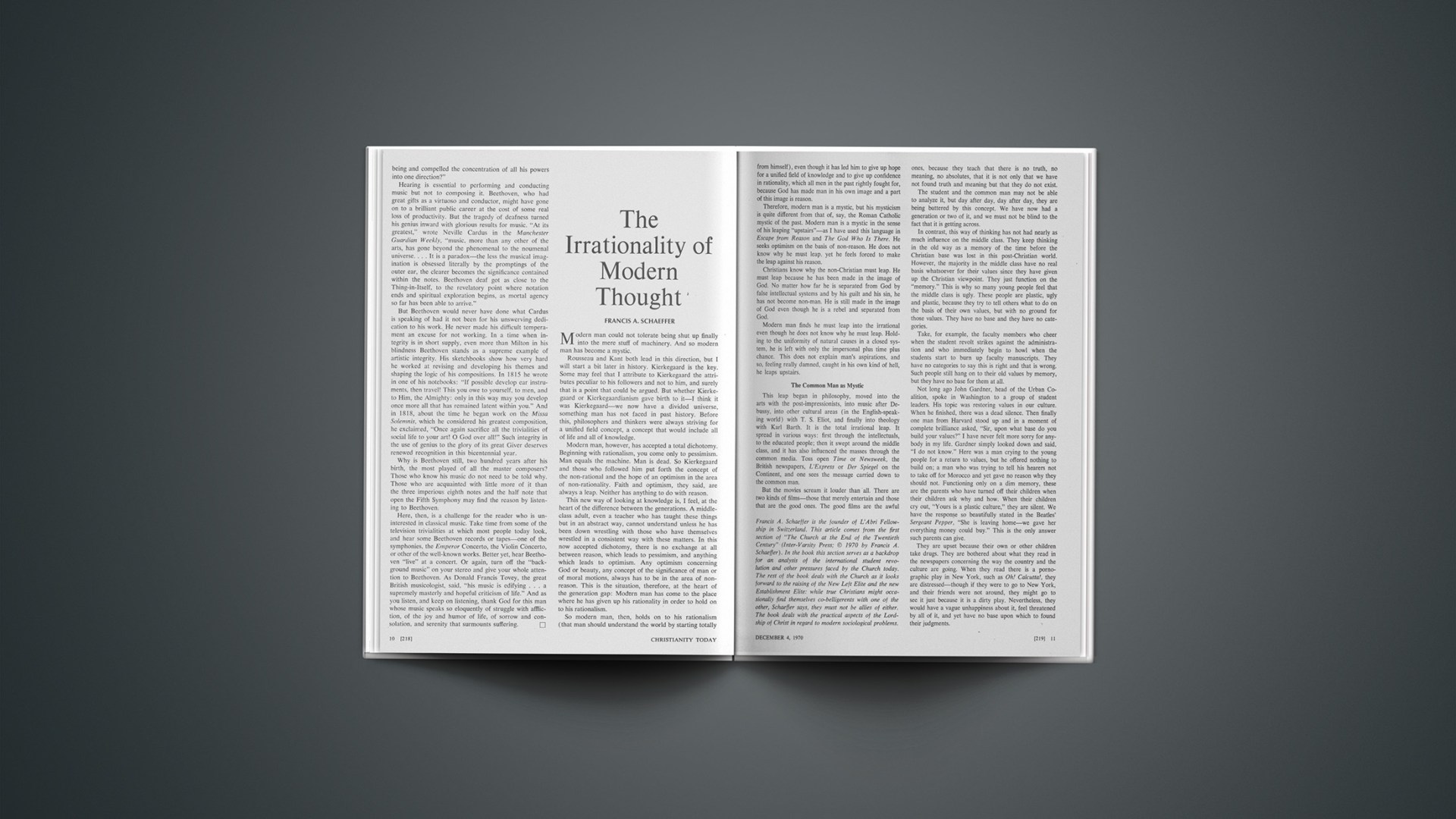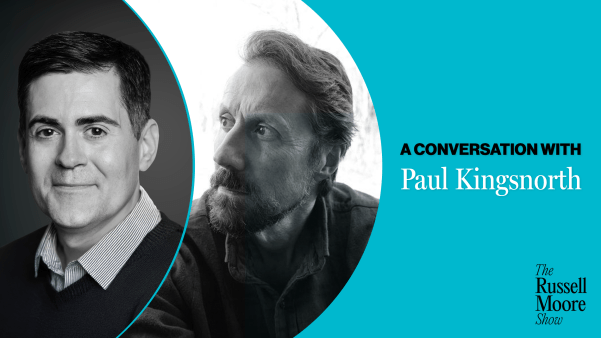Modern man could not tolerate being shut up finally into the mere stuff of machinery. And so modern man has become a mystic.
Rousseau and Kant both lead in this direction, but I will start a bit later in history. Kierkegaard is the key. Some may feel that I attribute to Kierkegaard the attributes peculiar to his followers and not to him, and surely that is a point that could be argued. But whether Kierkegaard or Kierkegaardianism gave birth to it—I think it was Kierkegaard—we now have a divided universe, something man has not faced in past history. Before this, philosophers and thinkers were always striving for a unified field concept, a concept that would include all of life and all of knowledge.
Modern man, however, has accepted a total dichotomy. Beginning with rationalism, you come only to pessimism. Man equals the machine. Man is dead. So Kierkegaard and those who followed him put forth the concept of the non-rational and the hope of an optimism in the area of non-rationality. Faith and optimism, they said, are always a leap. Neither has anything to do with reason.
This new way of looking at knowledge is, I feel, at the heart of the difference between the generations. A middle-class adult, even a teacher who has taught these things but in an abstract way, cannot understand unless he has been down wrestling with those who have themselves wrestled in a consistent way with these matters. In this now accepted dichotomy, there is no exchange at all between reason, which leads to pessimism, and anything which leads to optimism. Any optimism concerning God or beauty, any concept of the significance of man or of moral motions, always has to be in the area of non-reason. This is the situation, therefore, at the heart of the generation gap: Modern man has come to the place where he has given up his rationality in order to hold on to his rationalism.
So modern man, then, holds on to his rationalism (that man should understand the world by starting totally from himself), even though it has led him to give up hope for a unified field of knowledge and to give up confidence in rationality, which all men in the past rightly fought for, because God has made man in his own image and a part of this image is reason.
Therefore, modern man is a mystic, but his mysticism is quite different from that of, say, the Roman Catholic mystic of the past. Modern man is a mystic in the sense of his leaping “upstairs”—as I have used this language in Escape from Reason and The God Who Is There. He seeks optimism on the basis of non-reason. He does not know why he must leap, yet he feels forced to make the leap against his reason.
Christians know why the non-Christian must leap. He must leap because he has been made in the image of God. No matter how far he is separated from God by false intellectual systems and by his guilt and his sin, he has not become non-man. He is still made in the image of God even though he is a rebel and separated from God.
Modern man finds he must leap into the irrational even though he does not know why he must leap. Holding to the uniformity of natural causes in a closed system, he is left with only the impersonal plus time plus chance. This does not explain man’s aspirations, and so, feeling really damned, caught in his own kind of hell, he leaps upstairs.
The Common Man As Mystic
This leap began in philosophy, moved into the arts with the post-impressionists, into music after Debussy, into other cultural areas (in the English-speaking world) with T. S. Eliot, and finally into theology with Karl Barth. It is the total irrational leap. It spread in various ways: first through the intellectuals, to the educated people; then it swept around the middle class, and it has also influenced the masses through the common media. Toss open Time or Newsweek, the British newspapers, L’Express or Der Spiegel on the Continent, and one sees the message carried down to the common man.
But the movies scream it louder than all. There are two kinds of films—those that merely entertain and those that are the good ones. The good films are the awful ones, because they teach that there is no truth, no meaning, no absolutes, that it is not only that we have not found truth and meaning but that they do not exist.
The student and the common man may not be able to analyze it, but day after day, day after day, they are being battered by this concept. We have now had a generation or two of it, and we must not be blind to the fact that it is getting across.
In contrast, this way of thinking has not had nearly as much influence on the middle class. They keep thinking in the old way as a memory of the time before the Christian base was lost in this post-Christian world. However, the majority in the middle class have no real basis whatsoever for their values since they have given up the Christian viewpoint. They just function on the “memory.” This is why so many young people feel that the middle class is ugly. These people are plastic, ugly and plastic, because they try to tell others what to do on the basis of their own values, but with no ground for those values. They have no base and they have no categories.
Take, for example, the faculty members who cheer when the student revolt strikes against the administration and who immediately begin to howl when the students start to burn up faculty manuscripts. They have no categories to say this is right and that is wrong. Such people still hang on to their old values by memory, but they have no base for them at all.
Not long ago John Gardner, head of the Urban Coalition, spoke in Washington to a group of student leaders. His topic was restoring values in our culture. When he finished, there was a dead silence. Then finally one man from Harvard stood up and in a moment of complete brilliance asked, “Sir, upon what base do you build your values?” I have never felt more sorry for anybody in my life. Gardner simply looked down and said, “I do not know.” Here was a man crying to the young people for a return to values, but he offered nothing to build on; a man who was trying to tell his hearers not to take off for Morocco and yet gave no reason why they should not. Functioning only on a dim memory, these are the parents who have turned off their children when their children ask why and how. When their children cry out, “Yours is a plastic culture,” they are silent. We have the response so beautifully stated in the Beatles’ Sergeant Pepper, “She is leaving home—we gave her everything money could buy.” This is the only answer such parents can give.
They are upset because their own or other children take drugs. They are bothered about what they read in the newspapers concerning the way the country and the culture are going. When they read there is a pornographic play in New York, such as Oh! Calcutta!, they are distressed—though if they were to go to New York, and their friends were not around, they might go to see it just because it is a dirty play. Nevertheless, they would have a vague unhappiness about it, feel threatened by all of it, and yet have no base upon which to found their judgments.
And tragically, such people are on every side. They constitute the largest body in our culture—northern Europe, Britain, America, and other countries as well. They are a majority—the “Silent Majority”—but they are weak as water. They are people who like the old ways because they are pleasant memories, because they give what to them is a comfortable way to live. But they have no basis for their values.
Education, for example, is accepted and pressed upon their children as the only thinkable thing to do. Success is starting the child at the earliest possible age and then, within the fewest possible years, his obtaining a master’s or a Ph.D. degree. Yet if the child screams, Why?, the only answers are, first, because it gives social status, and then because statistics show that if you have a university or college education, you will make $10–15,000 more a year. There is no base for real values or even the why of a real education.
Huxley And The Drug Culture
It would likewise be possible to study the irrational leap toward non-rational values in existentialism, looking at the French, German, and Swiss philosophers Jean Paul Sartre, Martin Heidegger, and Karl Jaspers. The early Wittgenstein, too, is central. But here I will limit myself to just one more aspect before discussing the student rebellion in more detail.
That aspect is best seen in Aldous Huxley. You cannot understand the student generation without understanding him. Huxley is the father of the modern cult of drug-taking. Huxley did not suggest drugs as an escape. Rather, he said, because reason is not going to take us anywhere, one could give healthy people drugs and help them have some kind of experience which one could hope would be optimistic.
Huxley never gave up on this. In the last chapter of The Humanist Frame, which was edited by his brother Julian, it is clear that Aldous held this position to the end. He also made his wife promise that when he was dying she would give him LSD so he would die in the midst of a trip. This is the drug world. I have spoken with hundreds of people on drugs, but I have never met a really serious drug-taker (of course, this is not every little girl who begins to smoke grass simply because everybody around is smoking it) who did not understand that he was following Huxley’s concept of the upper-story leap, the upper-story hope.
Modern Theology And God-Words
Modern theology has not helped us. From Karl Barth on it is an upper-story phenomenon. Faith is a totally upstairs leap. The difficulty with modern theology is that it is no different from taking drugs. It is one trip or another. You may try LSD, you can try the modern theology. It makes no difference—both are trips, separated from all reason.
What we are left with is God-words. Students coming out of all kinds of backgrounds are saying, “I’m sick of God-words.” And I must respond, “So am I.” These theologians cut themselves off from any concept of propositional, verbalized revelation in the Bible. They are left upstairs with only connotation words and no content. For them, any concept of a personal God is dead, and any content about God is dead. They are cut off from any categories of absolute right and wrong, and thus they are left with totally situational ethics. That is all. As you listen to him, the modern theologian is only saying what the surrounding consensus is saying, but in theological terms. There is no help here.
John Cage And Hissing One’S Self
The irony of such a situation is played up by an event that happened to John Cage, the modern composer who writes music from a theory of chance, random selection. Leonard Bernstein once offered him the New York Philharmonic Orchestra. Cage directed some of his own chance music, and when it was over and he was starting to take his bows, he thought he heard steam escaping from the steam pipes. Then he realized that the musicians were hissing. As John Cage explains it, it must have been a traumatic experience. But I have often thought about what I would like to have said to the musicians there that night. I am sure that if one had had an hour with those musicians, he would have found that most of them really believed philosophically exactly what John Cage believes—that the universe begins with the impersonal plus time plus chance. Why were they hissing, then? They were hissing because they did not like the results of their own teaching when they heard it in the medium to which they were sensitive. They were hissing themselves.
A great number of parents and professors are hissing themselves. They do not like what students do. They do not like what that whole generation is doing. But what they do not face is what the musicians did not face—that basically they believe the same things and they are dishonest, or at least not consistent, in not doing what their children do. Their sons and daughters have simply taken what they have taught and carried it to its logical conclusion.
Malcolm Muggeridge has written much that is worthwhile, but to me the most striking thing he ever wrote was the article in the New Statesman (March 11, 1966) that showed he had changed his direction from the New Guardian Leftism to the new Malcolm Muggeridge. He called it “The Great Liberal Death-Wish.” He simply admitted that he had realized that the goal toward which he had been optimistically moving was not going to be realized. The liberalism in which he had his hopes had cut away all the groundwork and left no categories with which to judge. Muggeridge still feels this strongly: Liberalism has committed suicide because it has cut away its foundation. So the faculty scream with glee when students storm the administrative offices but squeal once they turn against the faculty. They have cut away their own foundations, and they have no categories with which to say what is right and what is wrong, no way to stop the flood they have loosed.
This is a complete contrast to that upon which government was built in the United States. We had freedom and form, form and freedom. Almost all human discussion can turn upon this frame—form and freedom, in the arts, in government, in society. Of course, we have had in the United States in the past a far from perfect situation and much for which we must say we are sorry. Yet the northern European Reformation culture has had a form and a freedom that no culture in the world has ever had before—unless it was a few small Greek city-states for a few years, and there is a question in my mind concerning that. But the northern European countries built on the Reformation had form and freedom, and there are specific Anglo-Saxon varieties of this: Samuel Rutherford, for example, the great leader of the second Reformation in Scotland and his book, Rex Lex. Law is king.
How could law—rather than arbitrary judgments of individuals or an elite—be king? Simply because God has spoken; there was a base upon which to build law. Law is to be seen not as floating on a sociological set of statistics but as resting on a solid foundation. This notion came into the United States constitution largely through Locke. Locke secularized this base, though even he cheated sometimes and quoted from the Gospels. The American constitution rested on Rex Lex, toned down through Locke, through such men as Jefferson, and directly through the great Witherspoon.
There is a huge painting by Paul Robert, a Swiss artist from a great family of artists, who painted in the Supreme Court Building in Switzerland just before 1900 Through Hugh Alexander he had become a Christian, and then he began to express his Christianity in his art. When he was asked to paint this tremendous mural on the stairway leading up to the Supreme Court offices, he expressed in painting what Samuel Rutherford placed in magnificent words. The title of the painting is Justice Instructing the Judges. In the foreground are all forms of litigation—the wife against the husband, the architect against the builder. Above them stand the Swiss judges with their little white dickeys. How are these people with their little white dickeys going to judge the litigation? A whole sociological theory is opened to question here. Robert’s answer is this: Justice, no longer blindfolded with her sword vertical, as is common, is unblindfolded with her sword pointing downward to a book on which is written “The Word of God.” Here is Rex Lex, because justice is not merely statistical averages. Here is something to build on.
Compare this with Wittgenstein’s and Bergman’s understanding of the problem of silence. In Robert’s scheme we are no longer like the fish in the room; no longer do we face cosmic alienation; no longer is there a lack of categories to explain why some things are right and some things are wrong; there is no reason why we cannot build without alienation. For there is revelation from outside man—propositional, verbalized revelation. It is not the Christians who have to leap. It is humanistic man who must leap into a mysticism with nothing there.
It is a matter of presuppositions. Many people catch the presuppositions as some children catch childhood diseases. They have no idea where they come from. But that is not the way the thinker chooses his presuppositions. His presuppositions are selected on the basis of which presuppositions fit what is; that is, what presuppositions give solid answers concerning what is. It is only the Christian presuppositions which explain what is—in regard to the universe and in regard to man.
Jesus’ Answer To Camus
Consider further Camus in The Plague. Nothing is better for understanding modern man’s dilemma. Modern man asks, “Where does justice come from? How can I move?” Camus says, “You can’t. You’re really damned.” The more you feel the tension of injustices, the more your damnation as modern man and the modern rationalist increases. In The Plague, which is Camus’s center piece, as the rats bring the disease into Oran, Jean Tarrou is faced with a dilemma. He may choose to join with the doctors and fight the plague, in which case he will be humanitarian, but he will be fighting God, in Camus’s construction. Or he can join with the priest and refuse to fight the plague, and he will be non-humanitarian. Poor Camus died with this dilemma upon him. He never solved it.
In contrast, of course, you have the magnificent account in the Bible. Jesus Christ, who is God and claims to be God in the full Trinitarian sense, stands in front of the tomb of Lazarus. As he stands in front of the tomb, he is angry. The Greek makes that plain. As Jesus stands there in his anger, we may notice something. The Christ who claims to be God can be angry at the result of the Fall and the abnormal event which he now faces without being angry at himself.
It is titanic. Suddenly I can fight injustice knowing I am not fighting what is good. It is not true that what is, is right. I can fight injustice knowing there is a reason to fight injustice. Because God does not love everything, because he has a character, I can fight injustice without fighting God.
What a contrast this is to Antonioni’s Blow-up! This movie is probably the most skillful of all the philosophic films. Two things are shown in Blow-up: first, murder without guilt (in other words, no moral categories), and second, love without meaning (no human categories).
But the modern mind goes further. It understands that if you abandon these categories, you also abandon the distinction between reality and fantasy—even if you are not on a drug trip. Juliet of the Spirits, The Hour of theWolf, Bel de Jour—all these films are saying the same thing. These are not extreme statements, not just theoretical theses. It is obvious that the thinking process is boiling over into practical results. I am intrigued by the fact that more and more young people come to me and say, “I can no longer be sure of what is real.” It is modern man’s dilemma.
Here, then, is the context in which the student revolt can be understood. This is how we came to be where we are. Society has reaped the rewards of its escape from reason. From modern science to modern, modern science, from man made in the image of God to man the machine, from freedom within form to determinism and autonomous freedom, from harmony with God to cosmic alienation, from reason to drugs and the new mysticism, from a biblically based theology to God-words—this is the flow of the stream of nationalistic history. Out of this stream comes the student revolution.
Francis A. Schaeffer is the founder of L’Abri Fellowship in Switzerland. This article comes from the first section of “The Church at the End of the Twentieth Century” (Inter-Varsity Press; © 1970 by Francis A. Schaeffer). In the book this section serves as a backdrop for an analysis of the international student revolution and other pressures faced by the Church today. The rest of the book deals with the Church as it looks forward to the raising of the New Left Elite and the new Establishment Elite: while true Christians might occasionally find themselves co-belligerents with one of the other, Schaeffer says, they must not be allies of either. The book deals with the practical aspects of the Lordship of Christ in regard to modern sociological problems.










